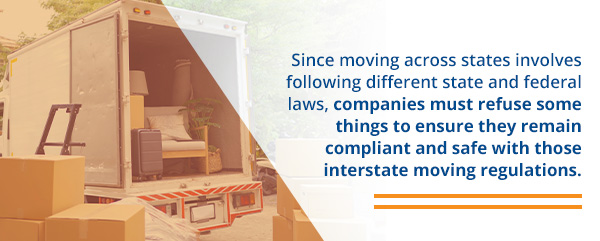
Moving is a big undertaking — if you’re using movers to help make your move more manageable, you need to know what items movers will not move. Understanding what movers will take will help you organize your packing and make your relocation as easy as possible.
Moving companies maintain a list of items movers won’t take. Each company has many reasons for refusing certain items — companies work to keep safety, legal compliance and item protection in mind at all times when operating. These restrictions are in place to protect the items being moved, other drivers on the road and the moving crew themselves. Moving company regulations revolve around:
Driver safety is paramount for moving companies. Allowing hazardous materials or prohibited items can endanger the moving crew and other drivers. Items like flammable materials, explosives or toxic chemicals could lead to accidents, fires or even health hazards. Refusing certain items helps prevent accidents for anyone involved in the moving process.
There are many complex regulations around moving items within and across states. Since moving across states involves following different state and federal laws, companies must refuse some things to ensure they remain compliant and safe with those interstate moving regulations. Failure to follow these regulations could result in fines, penalties and delays.

Moving companies want to protect the items they’re moving for all their customers. Properly handling and securing belongings prevents damage and loss during transit. Some items, like perishable goods, can spill and damage other items the mover is transporting. Other items, such as antiques or expensive jewelry can potentially be on a moving company’s restricted items list to protect the moving company from circumstances where those high-value items are damaged or go missing during the move.
When starting your moving journey, it’s important to remember that moving companies have restricted items. Moving regulations are in place to ensure the safety and legal compliance of everyone involved — make sure you listen to your moving company and follow their restricted items list.
Let’s look at some types of items that are strictly prohibited by moving services and those that are subject to various restrictions.
Goods with refrigeration requirements might be restricted due to limited transport time. Moving companies don’t want perishable goods melting or spoiling all over the other items.
Moving companies don’t transport live animals due to their specific care needs and potential stress during a move.
While some movers accept plants, many restrict them due to potential damage or pest concerns. Plants are fragile and highly sensitive to changing environments — moving can stress them out and even kill them. Furthermore, transporting plants can often require specific permitting and fall under regulatory requirements which a typical moving company may not be able to follow.
Transporting alcohol is subjected to specific regulations, depending on location. Moving companies may or may not allow the transport of alcoholic beverages based on where they are and where you’re moving to.
Moving firearms and ammunition varies by location and regulations but generally requires specific arrangements and compliance with local laws.
Household cleaning products contain many harmful chemicals. Moving companies usually refuse to take household cleaning products to avoid spills or hazards.
Prescription medications should be carried personally to ensure you have access to them during the move.
Wax candles may melt in the hot moving truck, leaving a waxy mess all over the vehicle and other items.
Flammable, explosive or toxic items — like gasoline, fireworks and chemicals — pose serious safety risks and are strictly prohibited. Moving hazardous materials should be done by you or your household since movers won’t take them.
Items of high value, like jewelry, cash or important documents, are often excluded from a moving company’s liability coverage. As such, moving companies tend to restrict these items to prevent instances where they’re responsible for costs due to damage or loss during transit.
Preparing items for movers is essential to ensure a smooth and safe relocation. Once you’ve removed everything the movers won’t take, you need to prepare the items they’ll be moving. Here are steps you can take:
Here are answers to some of your most common questions related to moving specific items. If you have further questions about packing for your move, don’t hesitate to contact your moving company for assistance. They’ll answer your questions and provide helpful information to ensure your move is as smooth as possible.
Most moving companies will not move laundry detergent. Detergent is a household cleaning agent that may qualify as a hazardous material. You should talk to your mover about whether or not they move laundry detergent to confirm the details. Since detergent is fairly easy to spill, you might be better off giving yours away or throwing it out and buying new once you arrive at your destination.
If your movers take laundry detergent, seal it properly to prevent leaks during transit. Pack it separately with other cleaning supplies to prevent potential damage to other items.
Movers may or may not take your shampoo. Cosmetic and hygiene products can easily spill all over other items or become hazards during the move. Always ask your mover if you need clarification on an item. If they allow shampoo, put tape over the opening and seal it in a plastic bag to contain any spills.

You should take your clothes out of your drawers for movers. If you leave them, movers will have to double-wrap the drawers to ensure they don’t pop open with all the extra weight. Additionally, your furniture will be much heavier and more challenging to move onto the truck if it’s full of clothes.
When moving, set aside some clothes in a suitcase to take with you so you have something to wear during the move. You can box up all your other clothing in sturdy boxes and label them for convenience. Your movers will have an easier time loading boxes, and you can ensure everything is separated and easy to unpack.
Moving companies will move most of your non-liquid, non-hazardous toiletries as long as they are packed. For liquids and chemicals like nail polish, you should talk to your moving company about what they will and won’t move.
Some movers will take plants, but your moving company and moving distance may affect this. Plants can be delicate, and being transported in a moving truck may stress them out, leading to wilting or death. Additionally, many plants are sensitive to light, humidity and temperature — the moving truck might not be the best environment for them. On longer trips, your plants will likely die if you don’t transport them yourself.

If you’re looking to make your moving experience seamless and stress-free, trust the experts at Transtar with your moving job. Our comprehensive moving and packing services are designed to make your transition to a new home as smooth as possible. We offer local and long-distance moving services so you can get to your new home quickly. Our packing services provide you with custom, careful packing for your South Jersey move. With Transtar, you can rest assured that your cherished possessions are in expert hands.
As an A+ Better Business Bureau-rated company, you’ll get the best, customer-oriented moving services every time. When you’re ready for an efficient and worry-free move, choose Transtar Moving Services to be your trusted partner. Get started with us by requesting a quote online today!